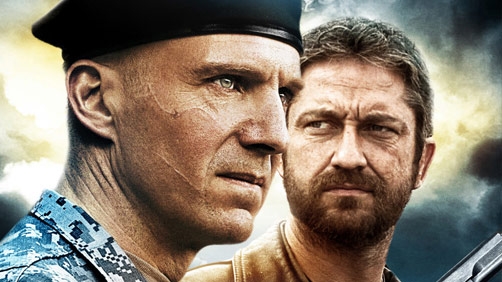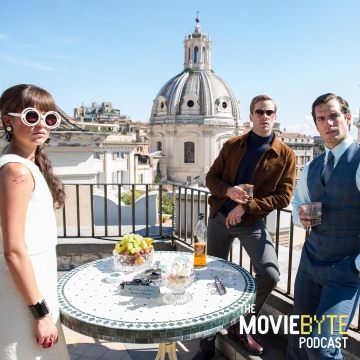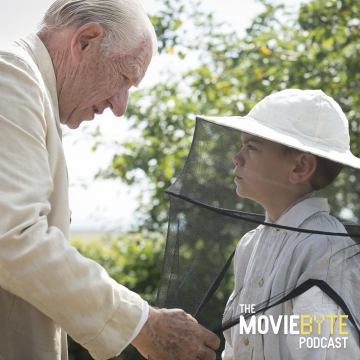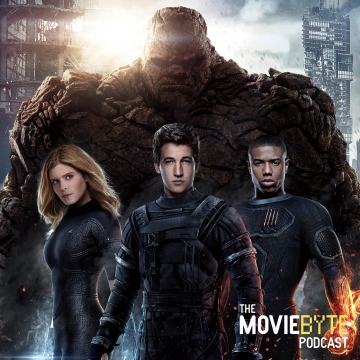
Riots. Famine. War. Politics. Scandal. And Shakespeare.
Ralph Fiennes works both sides of the camera in a stunning directorial debut that reimagines one of the Bard’s lesser known works in a 21st century setting. Coriolanus is the answer to those who wonder if Shakespeare still matters.
A Remarkable Reimagining
Fiennes stars as Caius Martius “Coriolanus”, a proud and illustrious Roman general suddenly pitted against his own people. Rebelling against the schemes of his manipulative mother, Volumnia (Vanessa Redgrave), and banished by the republic he has protected at all costs, Coriolanus makes an alliance with his sworn enemy Tullus Aufidius (Gerard Butler) and returns to Rome in search of bloody vengeance.
Working with screenwriter John Logan (Gladiator, Hugo), Fiennes places this ancient tale in a contemporary framework. Out with the togas and swords — in with the fatigues and automatic weapons. Rome has the look of a war ravaged Serbia. Such anachronisms might have been the downfall of the film, but they work exceedingly well here.

Fiennes leaves the classic Shakespearian dialogue untouched… to magnificent effect. The gritty filmmaking — punctuated by shots of bombed-out buildings, desolated streets, and angry mobs — serves to further highlight the elegance of the “Olde Englishe” dialogue. And when such dialogue is delivered by accomplished thespians like Ralph Fiennes, Vanessa Redgrave, and Brian Cox, the result is worth reveling in.
The acting is uniformly (and unsurprisingly) fantastic, but it is Fiennes who commands our most rapt attention. If you watch this film for no other reason, watch it for his performance. Splashed with blood and decorated with scars, this formidable actor doesn’t just play the part of Caius Martius “Coriolanus” — he is Ciaus Martius “Coriolanus.” Higher praise cannot be given.
Shakespeare Being Dead, Yet Speaketh
Coriolanus plunges deep into themes of power, honor, arrogance, and betrayal, but also speaks with relevance to the issues of today. Brett McCracken at Christianity Today observes,
Scenes of an angry mob of “plebeians” organizing, rioting, and using the media to spread their grievances against the aristocratic “1 percent” has obvious parallels to Occupy Wall Street and today’s global economic discontent. Other scenes of urban warfare—bodies in the street and bombed-out cars—evoke contemporary warzones like Iraq. But there are also timely commentaries on the role of personality in politics, the way that handlers can manipulate a politician’s image, and the speed with which public opinion can turn on a candidate when the slightest gaffe is recorded and virally spread throughout the populace.
An Exception to the Rule
As a general rule, I recommend people read before they watch: if a book-to-screen adaption is hitting theaters soon, make a point of reading the book first. Shakespeare is an exception to this rule, and the reason is fairly simple: the Bard never intended his plays to be read. He intended his plays to be performed, to be watched and enjoyed as entertainment. Reading Shakespeare therefore, is like reading the screenplay of a movie: reading it just isn’t the same as seeing it. If you want to read the original play before seeing Coriolanus, be my guest — but watching the movie first shouldn’t detract from your enjoyment of it in any way.
As a postscript, I found it interesting that Coriolanus met with critical acclaim upon its release, yet failed to find favor with general audiences. It has a score of 94% on Rotten Tomatoes, in contrast to the measly rating of 6.2 on IMDb. Perhaps being spoiled by filmmakers like Michael Bay has made us slow to appreciate more challenging entertainment — even when it’s delivered with the artistic finesse we see in Coriolanus.


